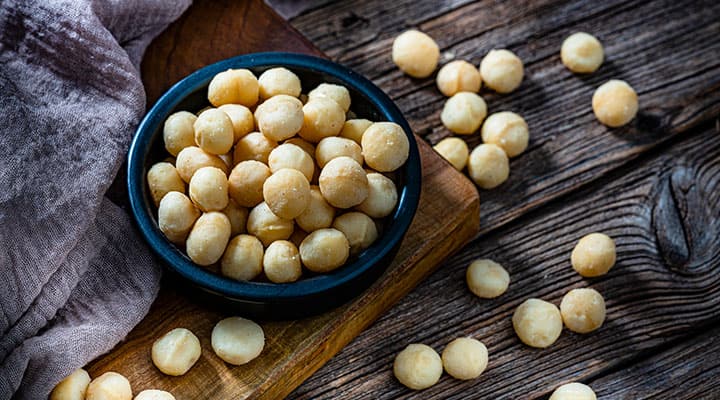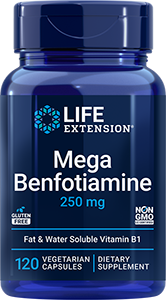
12 Foods High in Thiamine (Vitamin B1) + Recipe
Published: April 2023
Everyone knows vitamins D and C are health superstars, but B vitamins deserve just as much acclaim.
Vitamin B1 (also called thiamine or thiamin) is an essential nutrient found in both plant and animal foods that the body needs to carry out a range of biological processes, including helping create adenosine triphosphate (ATP) from the foods we eat. This is critical because every cell of the body uses ATP for energy.
Fortunately, you'll find many delicious dietary sources of this energizing B vitamin, from nuts, beans and seeds to meats such as ham. Understanding B1's important roles and which foods contain it (such as our vitamin-rich spring salad recipe) can help you determine if a thiamine supplement may be right for you.
What is vitamin B1?
Thiamine (thiamin) is just one of eight B vitamins, but it was the first vitamin B discovered (hence the name). The other B vitamins include riboflavin (vitamin B2), niacin (vitamin B3), pantothenic acid (vitamin B5), pyridoxine (vitamin B6), biotin (vitamin B7), folate (vitamin B9) and cobalamin (vitamin B12).
Each B vitamin plays specific roles in the body. For example, cobalamin (vitamin B12) is needed to form red blood cells and DNA. Folate (vitamin B9) is critical during periods of rapid growth such as during pregnancy and fetal development. Riboflavin (vitamin B2), niacin (vitamin B3) and pyridoxine (vitamin B6) play important roles in the breakdown of nutrients into energy.
As for B1 (thiamine), it supports healthy blood sugar metabolism and helps protect the body's tissues against advanced glycation end products and oxidative stress.
5 health benefits of thiamine
As a B vitamin, thiamine offers brain and heart benefits, but that's just the beginning for this nutrient:
Energy metabolism:
Thiamine plays a critical role in energy metabolism and in the growth, development and function of cells.Cardiovascular health:
Thiamine has been shown to support endothelial and cardiovascular health.Healthy glucose levels:
Vitamin B1 helps maintain already-healthy blood sugar levels.Healthy neurological system:
Thiamine-dependent enzymes are important for the synthesis of neurotransmitters, which are chemical messengers that work to keep the brain functioning.Mental health:
Research suggests thiamine may support mood and emotional health.
What foods are high in thiamine?
The best way to get ideal levels of vitamin B1—levels that provide true health benefits—is through supplementation, but adding these foods to your diet can also help.
Sunflower seeds:
Though typically consumed in smaller amounts due to their caloric density, sunflower seeds boast key nutrients, including vitamin E, and a healthy dose of vitamin B1 per 1-ounce serving.Black beans:
Legumes, like black beans and chickpeas, are good sources of thiamine and other B vitamins. A half-cup of cooked black beans provides 33% of your daily value of vitamin B1.Grains and cereals:
Whole-grain carbohydrates, such as long-grain brown rice and whole-wheat bread made with the entire wheat kernel, are considered good sources of vitamin B1. While brown rice is often considered a more nutrient-dense carbohydrate source compared to white rice, white rice that is enriched is also a source of thiamin. Additionally, fortified breakfast cereals provide thiamine.Seaweed (spirulina):
Green seaweed powder, which can seamlessly be incorporated into smoothies, is rich in a range of essential vitamins and minerals, including vitamin B1. Seaweed is one of the best naturally occurring food sources of B1.Flax:
Plant-based foods high in thiamine include nuts and seeds like flax. Flax can be ground and used as a plant-based egg-swap in baking.Hemp seeds:
Besides being one of the only plant-based sources of omega-3 fats, hemp seeds are a good source of vitamin B1.
Macadamia nuts:
In addition to being a source of thiamine, macadamia nuts are one of the lowest-carbohydrate and highest-fat nuts.Pistachio nuts:
In addition to offering a trio of nutrients that may help you feel fuller longer—plant protein, fiber and healthy fats—pistachios are also good sources of thiamine.Mung beans:
Mung beans are popular in many Asian cuisines such as soups, curries and even desserts. These small olive-green beans boast a mild flavor and offer a good source of vitamin B1.Ham:
While cereals and breads are among the most popular vitamin B1 sources consumed by Americans, animal protein, including ham, is also considered a good source.Soybeans:
Young soybeans, also known as edamame, are not only a good source of plant protein and fiber, they also are thiamin-rich.- Salmon: While typically touted for its omega-3 fats, which are important for heart and brain health, salmon is also a good source of B1.
Explore Our Best Energy Management Supplements
Spring Salad Recipe
If you are looking for a fresh and bright spring salad packed with thiamine-rich ingredients, look no further. This light and refreshing dish can be served as a side or boosted with additional protein like grilled salmon to build a complete meal with staying power.
Prep time: 10 minutes
Cook time: 12 minutes
Total time: 22 minutes
Ingredients:
- 1 cup asparagus, ends removed and chopped into 1-inch pieces
- ½ cup frozen peas, thawed
- 2 handfuls of mixed greens
- 3 radishes, thinly sliced
- ¼ cup toasted sunflower seeds
- ½ cup roasted chickpeas
- 1 medium avocado, pitted and diced
Dressing:
- ¼ cup lemon juice
- 1 tsp Dijon mustard
- 1 small garlic clove, minced
- ¼ tsp salt
- ⅛ tsp ground black pepper
- ¼ cup extra virgin olive oil
Preparation:
- Bring a large pot of water to a boil. Add the asparagus and peas to the water and cook for 3 to 5 minutes or until the asparagus is tender crisp and peas are bright green. Drain the peas and asparagus in a colander. Rinse with cold water to stop the cooking process.
- Make the dressing. In a medium bowl, whisk together the lemon juice, Dijon mustard, garlic, salt, pepper and olive oil.
- In a large bowl, place the cooked asparagus and peas, mixed greens, radish slices, chickpeas, sunflower seeds and avocado. Pour the dressing on top and toss to coat.
Nutritional Values per serving
Calories: 288
Carbohydrates: 18 g
Protein: 6 g
Fat: 22 g
How to increase your vitamin B1 intake
Besides incorporating vitamin B1-rich foods, you can boost your vitamin B1 intake with thiamine or benfotiamine supplements or a B-complex supplement that offers the full spectrum of B vitamins. B-complex vitamins support the proper assimilation of nutrients and energy from the foods we eat daily. B-complex may be beneficial for individuals who do not get enough of these essential nutrients from food alone.
Those looking to boost their B1 intake specifically, however, should consider a thiamine supplement.
Choosing a thiamine supplement: water-soluble vs. fat-soluble thiamine
Because thiamine is a water-soluble vitamin (like all B vitamins) that isn't stored in the body, it must be replenished daily. But high doses of water-soluble vitamins are thought to be excreted in the urine. Fortunately, thiamine (vitamin B1) is available in both a water-soluble form and fat-soluble form known as benfotiamine; of these two forms, benfotiamine is more bioavailable.
Life Extension offers a benfotiamine supplement made with the fat-soluble thiamine, a more bioactive form. Benfotiamine has been shown to support thiamine levels faster and longer than water-soluble B1.
Among the many benefits of benfotiamine is supporting healthy glucose metabolism. Maintaining already-healthy blood sugar levels both while fasting and after meals is integral to lasting health. Life Extension's quiz can help you determine the best supplements to support healthy blood sugar levels.
References:
- DiNicolantonio, J. J., et al. "Thiamine and cardiovascular disease: A literature review." Progress in Cardiovascular Disease. June 2018. https://www.sciencedirect.com/science/article/abs/pii/S003306201830029X
- Gibson, G.E., et al. "Vitamin B1 (thiamine) and dementia." Ann N Y Acad Sci. March 2016. https://www.ncbi.nlm.nih.gov/pmc/articles/PMC4846521/
- "Thiamin." National Institutes of Health. https://ods.od.nih.gov/factsheets/Thiamin-HealthProfessional/
- "Thiamin – Vitamin B1." Harvard School of Public Health. https://www.hsph.harvard.edu/nutritionsource/vitamin-b1/
- "Vitamin B1 (Thiamine)." MountSinai.org. https://www.mountsinai.org/health-library/supplement/vitamin-b1-thiamine
Like what you read?
Please subscribe to get email updates on this blog.









